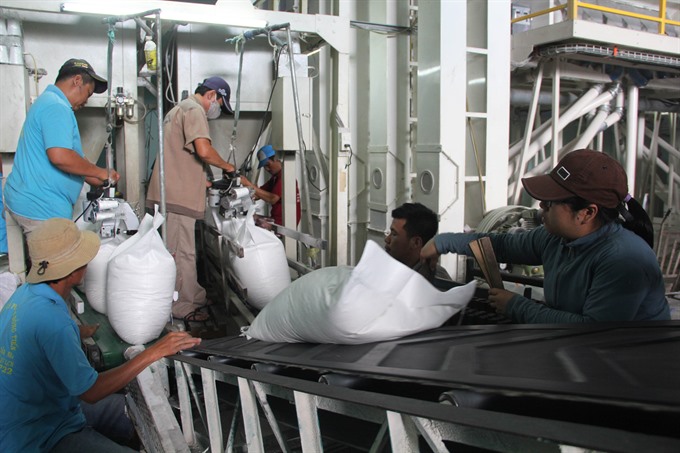The Vietnam Food Association (VFA) came under heavy criticism yesterday as economic experts voiced discontent with the association’s favoritism, lax business practices and overall incompetency in the rice export sector.
In its latest report, the Vietnam Institute for Economic and Policy Research (VEPR) claimed the VFA only represented the interests of state-owned enterprises (SoEs) in the agricultural field and did not hold itself responsible for aiding individual farmers or private sector firms.

Nguyễn Đức Thành, VEPR’s director, argued that the association was nothing more than a state management body and an extended governing arm to allocate rice export quotas instead of an advocate for all of its members.
He said one of the biggest barriers to joining the VFA was a compulsory certificate of eligibility, which proved to be difficult to obtain for small-scale export enterprises. As such, "though these firms often produce and develop food products with high added-value, they are in fact not eligible for VFA membership," Thành said.
Actual performance results show that VFA’s allocation decisions are based on a top-down and involuntary approach that lacks consultation with member firms, according to Thành. The VFA chiefly protects SoEs’ interests rather than the private sector’s, as evidenced by the implementation of many government-to-government contracts.
Thành said he believed that the VFA was just a placeholder name for big exporters, whose massive management and administration apparatus failed to work effectively despite their resources.
Meanwhile, Nguyễn Đình Bích, senior rice trade expert, argued that the VFA’s price floor policy is a failure and should be amended as soon as possible.
As stated in the 2010 Decree 109, the VFA is tasked with determining and announcing the export floor price for rice as a basis for firms to sign and register export contracts.
Such influence on the market has had the particularly significant impact, most notably when Vinafood I and Vinafood II, both major SoEs, signed a few concentrated contracts with fierce price competition, effectively wiping out smaller players on the domestic export front.
This meant the selling prices for rice under these contracts were very low in many cases, causing losses for private exporting enterprises and indirectly pushing down the price level at which rice is purchased straight from small-time farmers.
Bích said that international experience has shown how price flooring is a governmental failure to tackle market inadequacies. Furthermore, the rise of Chinese rice imports in Việt Nam has weakened the power VFA has over local consumption and pricing.
Thành backed his view by claiming that current favorable lending rates and stockpiling policy for rice purchase also benefit the VFA and other SoEs the most, instead of the majority of rice farmers.
The VEPR report assessed the VFA’s role in the rice sector and concluded that the association was in need of serious reform in order to regain fitness to lead the country’s rice market.
Võ Hùng Dũng, director of the Việt Nam Chamber of Commerce and Industry (VCCI) Branch in Cần Thơ City, said that the VFA lacked a clear market development strategy and resources to aid the private sector.
At the same time, it failed to constrain other SoEs to narrow the gap in market development capacity between the SoEs and smaller firms.
The association’s market strategy came from leading SoEs in concurrence with its leadership, though oftentimes SoEs were lagging behind in terms of market development and associated production capacity, he added.
Thành also said that the association’s trade promotion activities had been ineffective.
Not only did the VFA have no specific research and investment proposals for food production, processing and trade, it also failed to create opportunities for its members to receive any domestic and foreign investment capital.
He said such inefficiency was due to the government’s gradual assigning of more power to the VFA, especially as surplus domestic rice output rose and export turnover was deemed more important.
As a result, private-owned enterprises and local authorities were not allowed to take the initiative in managing rice purchasing policy, temporary storage and social responsibility for farmers’ livelihoods. The market situation was in the hands of the VFA.
According to the VEPR, not only should the VFA change its name to something reflecting work limited to exports, possibly the Vietnam Rice Exporters Association, but also enact long-term reforms, ensuring strict adherence to the principles of self-reliance and self-responsibility. Membership standards should also be expanded to maximize market potential for the domestic rice sector. — VNS
Source: http://vietnamnews.vn







